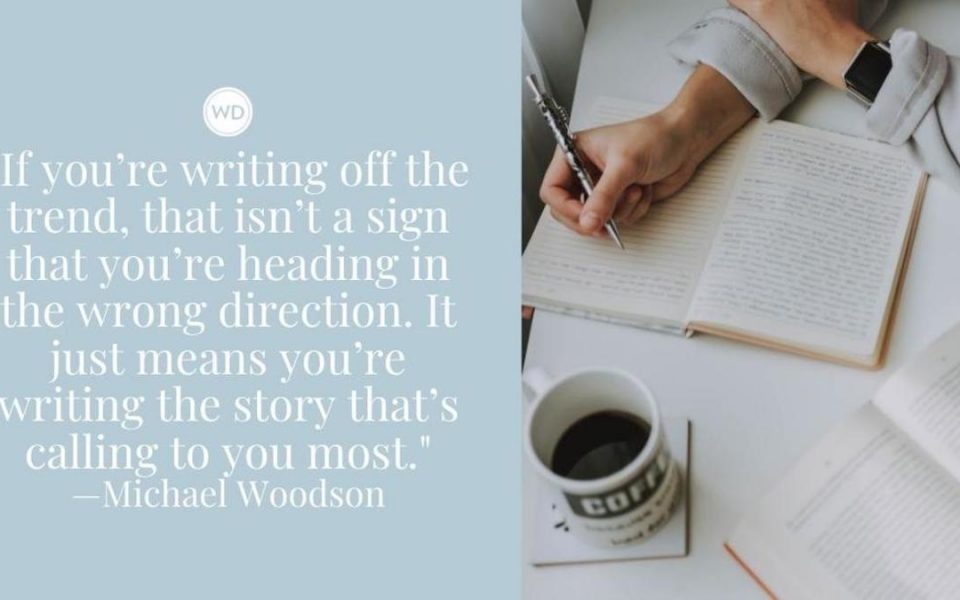Writing Mistakes Writers Make: Tailoring to Trends
Everyone makes mistakes—even writers—but that’s OK because each mistake is a great learning opportunity. The Writer’s Digest team has witnessed many mistakes over the years, so we started this series to help identify them early in the process. Note: The mistakes in this series aren’t focused on grammar rules, though we offer help in that area as well.
Rather, we’re looking at bigger picture mistakes and mishaps, including the error of using too much exposition, neglecting research, or researching too much. This week’s writing mistake is tailoring to trends.
Writing Mistakes Writers Make: Tailoring to Trends
I was late to the Hunger Games, er, game. The books had all been released before I’d even heard of them. A good friend of mine asked if I’d read them, and later that same day, somebody else asked us the same question. Call it serendipity or coincidence, but the fact that two different people had the same books on their minds at the same time felt like a cultural moment happening that I wanted to be a part of.
I bought the box set and devoured each of them, like most readers did. I’d read very little dystopian fiction at the time, and it had been a while since I’d read YA. I genuinely loved them and was shocked at how much they pushed the envelope of what young readers can handle.
The next year, a professor assigned The Hunger Games in a class where we were discussing pacing in fiction, and we dissected the propulsive way Suzanne Collins created suspense and tension in her first-person, present-tense narrative. We were experiencing everything with Katniss as she was experiencing it. What was to come next? None of us knew, including the character. This was unquestioningly exciting and masterful. Naturally, it paved the way for similar storytelling. But when we bend our own writing goals to follow what seems the most successful, we’re foregoing what we truly want along the way as writers.
Let me explain.
Although Suzanne Collins isn’t the first to write the dystopian novel, she’s arguably the most successful, with the Hunger Games trilogy spawning four movie adaptations and a prequel book in 2020, The Ballad of Songbirds and Snakes. And like with so many successful franchises, a wave of eerily similar media came after it. Bookstores were shelved with countless dystopian YA series, classics in the genre were getting modern remakes; even in writing classes, students were turning in excerpts of their dystopian sagas for workshop. There was a fever for it, and culturally, we encouraged it. Even I tried my hand at a dystopian story.
But therein lies a problem—an over-saturation, too much of a good thing, and reader interest waned. But not only that, many books became indiscernible from each other, and some teetering a bit too close to what came before it.
We talk a lot about writing the book you’d want to read. But we are multitudes, and many of us are readers of myriad genres. And every once in a while, a book or series comes along the becomes a collective experience and cements itself in the pop cultural zeitgeist. This can be confusing for writers; seeing how explosive a book can become can make us feel like we ought to shift our writing tendencies and write stories that reflect what readers are interested in today.
On one hand that’s true, it’s important to know and understand reading habits on our continued writing journeys. But these trends in fiction, these once-in-a-blue-moon sensations that fleetingly permeates every publishing possibility isn’t typical, it is atypical. That is neither good nor bad, it simply means we shouldn’t change our writing goals for them. Essentially: If you’re writing off the trend, that isn’t a sign that you’re heading in the wrong direction. It just means you’re writing the story that’s calling to you most.
The Hunger Games series’ popularity has never gone away, though it has settled, and it undoubtedly started a trend. That trend too has lessened, and again, that means nothing in the way of its overall appeal or quality. I point it out merely to say that a trend is not a total shift and is not an indication of the only way to be a successfully published author. If anything, trends can represent that there is a reader in all of us, and the more a popular series can bring new readers to bookstores, the more likely a reader will find the story you’ve written for them beyond the trend.
Remember that dystopian story I tried to write that I mentioned? I never got beyond the first page. It never felt like me, what I want to write. This, at first, felt like a failure—like the writer I felt myself to be was unwelcome. All I can say is with time and continued practice, that feeling began to fade—not just the feeling that I wasn’t good enough to write what’s popular, but the feeling that it even mattered to begin with.
In fact, as I sit down to write, I don’t worry myself with the possible popularity of my writing. After all, I doubt Suzanne Collins had any inclination that her series would become what it did. She started like the rest of us do—with the seed of an idea and a hope to share it. So enjoy the trend, and certainly learn something from it (there’s nothing you can’t learn from reading other genres!), but don’t take it as a sign that something in your writing needs to drastically change.

Push yourself beyond your comfort zone and take your writing to new heights with this novel writing course, designed specifically for novelists who are looking for detailed feedback on their work. When you take this online course, you won’t have weekly reading assignments or lectures. Instead, you’ll get to focus solely on completing your novel.


